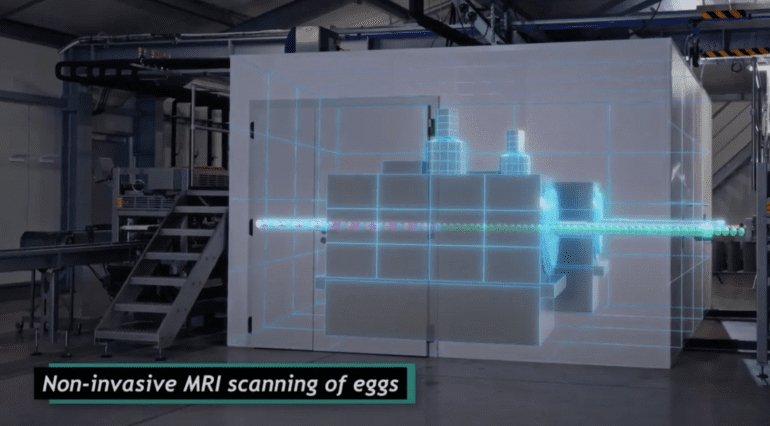TL;DR:
- Germany, France, and Italy enacted laws to halt the culling of male day-old chicks.
- Hyperspectral imaging detects chick gender, but it’s slow.
- Munich’s Orbem combines MRI and AI to determine egg sex in one second.
- Orbem raised €30M in Series A funding, building on €10M from grants.
- Their technology has applications beyond poultry, including nuts and construction materials.
- AI and MRI integration is a significant trend with substantial patent activity.
- The AI medical imaging market could reach $29.8 billion globally by 2032.
Main AI News:
In a remarkable twist of technological prowess, the landscape of gender determination in the poultry industry is undergoing a revolutionary transformation. Germany, France, and Italy, nations renowned for their commitment to animal welfare, recently enacted legislation aimed at curbing the practice of culling male day-old chicks due to their inability to lay eggs. While this move was primarily driven by ethical and humane considerations, it inadvertently set the stage for technology companies to devise innovative solutions for sexing chicks before they hatch.
One such groundbreaking technology, hyperspectral imaging, has emerged as a game-changer in this domain. By meticulously analyzing the plumage color of chicks on the 13th day of incubation, hyperspectral imaging has made it possible to accurately determine their gender. At the forefront of this transformative technology is a fully automated system aptly named “CHEGGY,” which is currently employed in commercial hatcheries.
The capabilities of these systems extend beyond gender identification; they can assess various aspects of eggs, including freshness, broken yolks, and shell integrity, achieving up to a remarkable 97% accuracy in some cases. However, there’s a lingering challenge: the process is agonizingly slow.
Enter Orbem, a Munich-based startup born out of PhD research in MRI technology, on a mission to revolutionize this space by expediting the process. They have ingeniously fused an industrial MRI scanner with an AI-based platform, creating a contactless and non-invasive method for determining an egg’s sex. Orbem claims to accomplish this feat in just one second, significantly outpacing existing methodologies.
With approximately 20 million eggs scanned, Orbem now proudly asserts its profitability. The company, founded in 2019, has secured an impressive €30 million ($31.8 million) in a Series A funding round led by 83North, with participation from new investor La Famiglia and existing backers, The Venture Collective and Possible Ventures. Notably, Orbem had previously raised €10 million, half of which was in the form of equity-free funds, courtesy of research grants from the European Union and the German government.
Orbem’s origins trace back to the meeting of its founders during their PhD studies at the Technical University of Munich, where they hatched the idea to address the multitude of challenges facing the poultry industry. Dr. Pedro Gómez, co-founder and CEO of Orbem, emphasized their initial focus on poultry, citing the industry’s inefficiencies in dealing with unfertilized eggs and the ethical issues surrounding the culling of male chicks. He also highlighted the company’s technological prowess, showcasing its ability to create systems that seamlessly integrate into traditional sectors like poultry.
Orbem, however, has grander ambitions than just revolutionizing the poultry industry. They envision applying their technology to diverse sectors, such as inspecting nuts for parasites or enabling dynamic pricing by grading nuts within their shells. Furthermore, Orbem’s technology has the potential to scan various biological samples, from different plant species to even the human body. The prospect of using MRI to ensure structural integrity in biodegradable construction materials hints at a multitude of applications.
The fusion of MRI and AI is undoubtedly a trend worth monitoring in the years ahead. The medical devices industry alone has witnessed over 710,000 patents related to “AI for MRI” filed and granted in the last three years, according to GlobalData. Moreover, AI in the medical imaging market is poised to reach a staggering $29.8 billion globally by 2032, as predicted by Allied Market Research.
In the realm of medical imaging, AI is progressively replacing less effective and invasive methods. Oliver Schoppe, a Principal at UVC Partners familiar with Orbem, commented on this trend, stating, “AI may be a hot topic in venture capital, but its substantial impact is undeniable. Unlike most startups, Orbem possesses a sustainable competitive edge through their extensive technical vertical integration, down to the very hardware of MRI.“
Conclusion:
The integration of AI and MRI technology, as exemplified by Orbem’s breakthrough in gender determination for eggs, holds great promise for various industries. This innovative fusion is likely to drive efficiency, precision, and competitiveness, making it a trend worth monitoring closely in the evolving market landscape.

